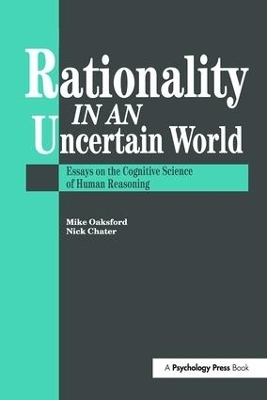
Rationality In An Uncertain World
Routledge (Verlag)
978-1-138-87716-0 (ISBN)
This book brings together an influential sequence of papers that argue for a radical re-conceptualisation of the psychology of inference, and of cognitive science more generally. The papers demonstrate that the thesis that logic provides the basis of human inference is central to much cognitive science, although the commitment to this view is often implicit. They then note that almost all human inference is uncertain, whereas logic is the calculus of certain inference. This mismatch means that logic is not the appropriate model for human thought.
Oaksford and Chater's argument draws on research in computer science, artificial intelligence and philosophy of science, in addition to experimental psychology. The authors propose that probability theory, the calculus of uncertain inference, provides a more appropriate model for human thought. They show how a probabilistic account can provide detailed explanations of experimental data on Wason's selection task, which many have viewed as providing a paradigmatic demonstration of human irrationality. Oaksford and Chater show that people's behaviour appears irrational only from a logical point of view, whereas it is entirely rational from a probabilistic perspective. The shift to a probabilistic framework for human inference has significant implications for the psychology of reasoning, cognitive science more generally, and forour picture of ourselves as rational agents.
Nick Chater, Mike Oaksford
Part I: problems with logicism; autonomy, implementation and cognitive architecture - a reply to Fodor and Pylyshyn; connectionism, classical cognitive science, and experimental psychology; against logicist cognitive science I - the core argument; against logicist cognitive science II - objections and replies; reasoning theories and bounded rationality; bounded rationlity in taking risks and drawing inferences; logicism and everyday reasoning - mental methods and mental logic; the falsity of folk theories - implications for psychology and philosophy. Part II: the probablistic approach; a rational analysis of the selection task I - optimal data selection; a rational analysis of the selection task II - abstract materials; a rational analysis of the selection task III - thematic materials; a rational analysis of the selection task IV - implications; rational explanation of the selection task; information gain explains relevance, which explains the selection; current developments and future directions.
| Erscheint lt. Verlag | 4.2.2019 |
|---|---|
| Verlagsort | London |
| Sprache | englisch |
| Maße | 156 x 234 mm |
| Gewicht | 453 g |
| Themenwelt | Geisteswissenschaften ► Philosophie ► Logik |
| Geisteswissenschaften ► Psychologie ► Allgemeine Psychologie | |
| Geisteswissenschaften ► Psychologie ► Verhaltenstherapie | |
| ISBN-10 | 1-138-87716-6 / 1138877166 |
| ISBN-13 | 978-1-138-87716-0 / 9781138877160 |
| Zustand | Neuware |
| Informationen gemäß Produktsicherheitsverordnung (GPSR) | |
| Haben Sie eine Frage zum Produkt? |
aus dem Bereich


